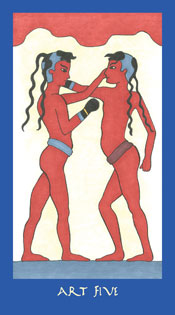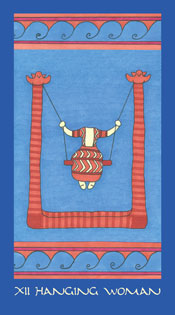

|
|
|
|
|---|---|---|

|
The Minoan Tarot is a focused, idiomatic view of the Minoan cultural and spiritual paradigm. The art for this unique deck was derived from Minoan artifacts, paintings, and carved jewelry created on the Mediterranean island of
Crete between 2,600 to 1,110 BCE. The Minoans were a highly sophisticated culture that was destroyed by a catastrophic volcanic eruption in the 15th century BCE. It may well be that Plato’s legend about the island of Atlantis was
actually about the Minoans.
The art is striking: primitive yet elegant, anatomically precise yet graphic. The color palette centers on a range of blues, a prominent color common to seafaring, island-dwelling peoples. The blues are contrasted with white, warm shades of terra cotta, gold, umbers, and greens. Each image is a modern rendering of an ancient image. The wisdom conferred by each image is derived from the artist’s years of immersion in the Greek culture. Over a thousand years of Minoan artistic evolution is made coherent through Ms. Lorenzi-Prince’s personal illustrative style. The impact is uncluttered and harmonious while retaining all the raw power of ancient art. The trumps generally follow the canon of the Major Arcana while being cleverly transformed to embrace the religious and cultural iconography of the Minoans. The cards are renamed to reflect important concepts and ideals. The High Priestess equivalent card, II Oracle, depicts the familiar faience Snake Goddess statuette from the New Palace Period at Knossos. It’s a feminine version of the constellation Ophiuchus, a Babylonian constellation that changed genders over the centuries. The Minoans exalted the Goddess and sacred snakes. The Oracle holds snakes in both hands and has a smug kitty perched on her head. “She hears the whisper of the future. She sees the husk of the past. She sees the soul unfolding like a rose…she speaks what she sees without shame, judgment or mercy.” One of the most fascinating trump translations is XII Hanging Woman, which depicts a headless priestess on a swing. She is “suspended between Heaven and Earth and also between the gateway created by two sacred pillars, [and] hangs poised among the powers of her world.” The Minor Arcana is more divergent from the RWS tradition. The suits do not directly correspond to Wands, Cups, Swords and Pentacles. The four suits are transformed into the divine realms of Earth, Sea, and Sky, accompanied by the human realm of Art. Numeric suit symbols are omitted in the imagery of the pip cards. The pip cards of the Earth suit present land animals; the Sea cards depicts watery creatures, and the cards of the Sky suit offer a variety of birds. The suit of Art shows people engaged in normal activities. The Courts are revised to reflect social roles and valued cultural traits. Their titles are Mistress, Master, Priestess and Worker. The characters represent deities of the suit’s realm. Each Court persona reflects qualities enhanced by intimacy with the specific element that are revealed in both physical and spiritual modes. For example the Art Priestess “presides in darkness over the mysteries of the night [where] the incredible power of the unconscious provides solutions to dilemmas that logic cannot answer…” The written descriptions of all 78 cards provided in the booklet explain the image and its symbolic content, and include three Messages that offer insights to the seeker. Two variations on the three-card spread are offered at the end of the booklet. What I found most striking about this deck release is that it depicts a happy, vibrant, energetic culture. The Minoan culture was closely integrated with the natural world. Gender roles were fluid. The mysteries and creatures of earth, sea and sky were regarded as sacred and accorded respect. People observed nature’s inhabitants and appreciated their lessons about surviving in each realm. Animals were not regarded as mindless resources ripe for unbridled human exploitation. The Minoans lived quite well without cell phones, computers, or televisions. Their spiritual traditions did not subordinate or suppress one gender at the expense of the other, nor were environmental resources taken for granted, pillaged, polluted or squandered. They were experts at water management. Their communal efforts were geared toward collective benefits rather than militaristic conquests. They built towns and pleasure palaces instead of fortifications. The Minoan Tarot arrives when people desperately need to see a role model of a healthy, balanced society. Coincidence or synchronicity? The Minoans, like contemporary populations, existed in a time and place with severe risks from natural catastrophes. Each time the island was damaged by an earthquake, a deliberate effort was made to rebuild with greater beauty and more refined artistry. They built towns and palaces without power tools or combustion engines, and extruded rich harvests without chemical fertilizers, pesticides or herbicides. The Minoans are a model of Better Living Without Chemistry or Advanced Technology. We have come too far down the road of scientific development to turn back, but that doesn’t prevent determined forces within society from adjusting the role of science, technology, and capitalism away from control and destruction and toward a role subordinated to the well-being, peace, health, and prosperity of all. Ms. Lorenzi-Prince may not have intended the Minoan Tarot as a socio-political statement. Nevertheless, the balanced, creative society of the Minoans cannot help but stand in contrast to the sick, unbalanced, and sometimes violent world we occupy today. The degree of illness is sometimes best understood when compared to an image of vibrant health. It is a potent reminder that the retrospective eyes of history judge every civilization’s merits by the degree to which it embraced civility, engendered peaceful prosperity, and provided an environment for an abundant outpouring of collective creative expression. This deck is at the liminal boundary as a spiritual tool, occupying a unique place as a tarotesque oracle or as an oracular tarot deck. Readers will have to work closely with the thoughtfully-written booklet to learn the card meanings. It has the potential to greatly reward its devotees. The messages provided for each card steer the individual toward stability, vitality, and wellness. As with the previously-released spectacular Dark Goddess Tarot, Ellen Lorenzi-Prince and Arnell Ando have continued to adhere to the highest production standards. The Minoan Tarot is beautiful, evocative, and inspiring. Another round of congratulations is due to this production team for their ingenuity and exceptional artistic integrity. Publisher: Arnell’s Art, 2014. 78 card deck with a 92-page bound booklet in a 2-part custom box. $40.00 plus shipping and handling. Available here
|

|
|
|
Minoan Tarot is copyright protected. Card images may be used on blogs/websites as 'Card of the Day' endeavors or for review purposes but must contain the website along with Minoan Tarot by Ellen Lorenzi-Prince. The images are not to form part of written teaching materials or otherwise be used without prior consent from the artist. | |
|
|
Home · Tarot of the Crone · Dark Goddess Tarot · Minoan Tarot · Arts & Artifacts · Contact | |
|
This site designed & maintained by Arnell's Art |